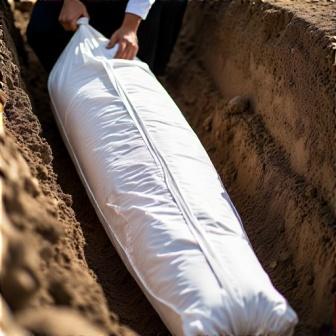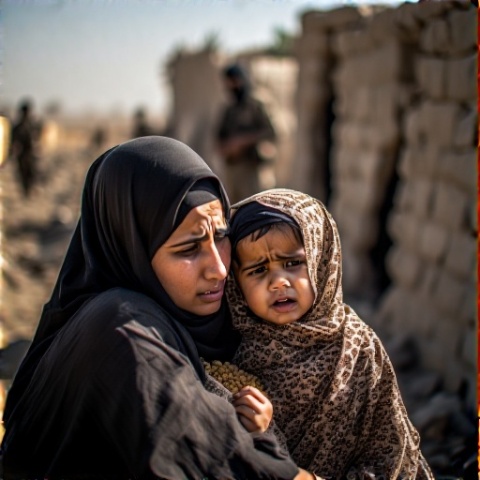In our modern world, we are taught to think of investments in terms of money, property, or career advancement. We spend our lives building up assets, hoping to secure a comfortable future. But what about the ultimate future—the life that comes after death? The one that is eternal and truly matters? Islam presents a profound and beautiful perspective on this, identifying the most valuable and enduring investment a person can ever make. It is not in gold or land, but in something far more precious: our children.
For many, children are seen as a heavy responsibility, a source of endless work, worry, and financial strain. While these aspects are part of the reality of parenthood, the Islamic framework elevates the role of children far beyond this narrow view. In Islam, a child is a sacred trust from Allah (SWT), and the act of raising them correctly is the single greatest opportunity a person has to secure their own salvation and success in the Hereafter.
The Divine Trust: Understanding the Role of Offspring in Islam
Before we can appreciate our children as a spiritual investment, we must first understand their fundamental role within the Islamic worldview. They are, first and foremost, a gift and a blessing from Allah (SWT).
Children as a Blessing from Allah
The Holy Quran speaks of children as a source of joy and beauty in this life, a fulfillment of a natural human desire. Prophets like Ibrahim (PBUH) and Zakariyyah (PBUH) supplicated to Allah (SWT) for righteous offspring, demonstrating that children are a cherished blessing.
ٱلۡمَالُ وَٱلۡبَنُونَ زِینَةُ ٱلۡحَیَوٰةِ ٱلدُّنۡیَاۖ وَٱلۡبَـٰقِیَـٰتُ ٱلصَّـٰلِحَـٰتُ خَیۡرٌ عِندَ رَبِّكَ ثَوَابࣰا وَخَیۡرٌ أَمَلࣰا
Wealth and children are [but] adornment of the worldly life. But the enduring good deeds are better to your Lord for reward and better for [one’s] hope.
[18:46]
This verse highlights that children are part of the beauty and decoration of the worldly life. They bring a unique kind of happiness and purpose. However, the verse does not stop there. It continues: “…but the lasting good deeds are better in the sight of your Lord for reward and better for hope.” This transition is key. While children are a blessing, their true value is unlocked when they become a means for us to perform “lasting good deeds.” This is the essence of the investment model we will explore.
Children as a Test and a Responsibility
At the same time, the Quran reminds us that children are also a test. They test our patience, our generosity, our priorities, and our faith.
إِنَّمَاۤ أَمۡوَ ٰلُكُمۡ وَأَوۡلَـٰدُكُمۡ فِتۡنَةࣱۚ وَٱللَّهُ عِندَهُۥۤ أَجۡرٌ عَظِیمࣱ
Your wealth and your children are only a trial, whereas Allah! With Him is a great reward (Paradise).
[64:15]
This verse is not meant to be a negative warning. Rather, it is a reminder that everything in our possession, including our children – is a test of our obedience to Allah (SWT). Do we raise them in a way that is pleasing to Him? Do we prioritize their spiritual well-being over their worldly success? The “great reward” mentioned in the verse is the prize for those who successfully pass this test. Therefore, the task of raising children is not merely a worldly duty; it is an act of worship, a spiritual responsibility that carries an immense reward.
The Hadith of the Three Enduring Deeds: The Foundational Principle
The most powerful and direct evidence for the topic of this article comes from a famous and beautiful Hadith of the Prophet Muhammad (PBUH). This Hadith is the cornerstone of the entire concept of children as a lasting investment.
The Prophet (PBUH) said, “When a man dies, all his deeds come to an end, except for three: an ongoing charity (sadaqah jariyah), beneficial knowledge, or a righteous child who prays for him.” (Sahih Muslim, Hadith 1631)
This Hadith is a beacon of hope for every believer. It tells us that even after we have breathed our last, our account of good deeds does not necessarily close. There are three specific ways in which we can continue to earn rewards, even from our graves. The most personal and intimate of these three is the “righteous child who prays for him.”
How a Righteous Child is an Ongoing Charity
The term sadaqah jariyah refers to an ongoing charity, a good deed whose benefits continue to be reaped long after the initial act is done. Examples include building a mosque, digging a well, or planting a tree. The Hadith places a righteous child in the same category, equating the upbringing of a pious child to an enduring act of charity.
The reason is simple: every good deed that a child does after their parents’ death is, by extension, a result of the parents’ effort in raising them. When the child prays, fasts, gives charity, reads the Quran, or teaches others, a portion of the reward goes back to the parents who taught them. This is the ultimate “return on investment.” The parent is earning rewards for acts they are no longer physically able to perform. This is the essence of sadaqah jariyah—an act that keeps giving. It is a spiritual legacy that continues to grow and multiply, reaching the parents in their graves and shining a light for them on the Day of Judgment.
A Parent’s Role: Nurturing the Investment for the Hereafter
To reap the rewards of a righteous child, parents must actively invest in their children’s upbringing. This is not a passive process. It is a full-time, conscious effort known as tarbiyah in Islamic terms, which means a comprehensive, holistic upbringing.
The Importance of Tarbiyah (Islamic Upbringing)
Tarbiyah involves nurturing the child in all aspects: spiritual, intellectual, emotional, and physical, all within an Islamic framework. It is the practical step of turning the potential of a child into the reality of a righteous individual.
The Prophet (PBUH) said, “A man is a shepherd in his household, and he is responsible for his flock.” (Sahih Al-Bukhari, Hadith 893).
This Hadith establishes the parent’s role as a caretaker and a leader, responsible for guiding their children onto the straight path.
Teaching Tawhid and the Quran
The foundation of tarbiyah is teaching Tawhid—the absolute oneness of Allah (SWT). This must be the very first lesson a child learns. It is the anchor of their faith and the source of all good deeds. Parents must teach their children who Allah (SWT) is, His beautiful names and attributes, and why He alone is worthy of worship.
The Prophet (PBUH) once advised his young companion, Ibn Abbas (RA), “Be mindful of Allah, and Allah will protect you. Be mindful of Allah, and you will find Him in front of you. If you ask, ask Allah. If you seek help, seek help from Allah.” (Jamiat-Tirmidhi, Hadith 2516).
This powerful advice encapsulates the core ofTawhid` and shows the kind of direct, personal instruction parents should give their children.
Teaching the Quran is another cornerstone. The parents’ effort to teach their child even a single letter of the Quran is a monumental deed.
The Prophet (PBUH) said, “The best among you are those who learn the Quran and teach it.” (Sahih Al-Bukhari, Hadith 5027).
When a child learns and recites the Quran, the parents receive a share of the reward. If the child memorizes the Quran, the reward is so great that on the Day of Judgment, the child will be given a crown to wear, and the parents will be given magnificent garments that the inhabitants of Paradise will marvel at.
Instilling Good Character and Islamic Manners
A righteous child is not just one who prays, but one who embodies good character and manners. The Prophet (PBUH) was sent to perfect moral character, and this is a central goal of Islamic parenting. Parents must teach their children to be:
- Honest and trustworthy.
- Kind and respectful to their elders.
- Compassionate to the young.
- Generous and forgiving.
- Modest and humble.
These are the qualities that make a person a true Muslim.
The Prophet (PBUH) said, “I guarantee a house in the highest part of Paradise for one who has good manners.” (Sunan Abi Dawud, Hadith 4800).
By teaching our children good character, we are paving their way to Paradise and, by extension, our own. The effort we make to model and teach these virtues is the investment that truly pays off.
The Perpetual Return: How Righteous Offspring Benefit Their Parents
The Hadith of the three enduring deeds promises a return on our investment, but let’s look at the specifics of how this benefit manifests.
Dua (Supplication) That Reaches the Deceased
The most immediate and continuous benefit is the dua (supplication) made by a righteous child for their deceased parents. When we die, our ability to perform good deeds stops, but the dua of a righteous child can continue to elevate our status and seek forgiveness for our sins.
The Prophet (PBUH) said, “Indeed, a man will be elevated in status in Paradise, and he will say: ‘Where did this come from?’ And it will be said to him: ‘From your son’s asking of forgiveness for you.'” (Sunan Ibn Majah, Hadith 3660).
This is a beautiful testament to the power of a child’s prayer. A child who has been taught to love Allah (SWT) and to remember their parents will be a source of continuous good for them, long after they are gone.
The Reward of Good Deeds Done by Children
Every single good deed performed by the child—every prayer, every act of charity, every kind word—earns the parents a share of the reward. This is because the child’s goodness is a direct result of the parents’ effort and guidance.
The Prophet (PBUH) said, “Whoever guides to a good deed is like the one who does it.” (Sahih Muslim, Hadith 1893).
A parent’s guidance is the ultimate form of “guiding to a good deed.” The parent has essentially set up a system of continuous rewards that will function on their behalf for as long as their children, and even their children’s children, continue to perform good deeds.
The Role of Children in the Intercession on the Day of Judgment
Finally, on the Day of Judgment, the righteous children will be a source of mercy for their parents. The Prophet (PBUH) said, “The fasting and the Quran will intercede for the servant on the Day of Resurrection…” (Musnad Ahmad). Similarly, children who have died in their youth can intercede for their parents.
The Prophet (PBUH) said, “The Muslim women who have had three children (who died) before reaching the age of puberty will have them as a shield for them from the Fire.” (Sahih Al-Bukhari, Hadith 1251).
While this Hadith is specific to a certain scenario, it shows the power of children as a means of mercy and intercession for their parents on the most difficult day.
Beyond the Hereafter: The Blessings of Righteous Children in this World
While the primary focus of this article is the Hereafter, it is important to acknowledge that the investment in righteous children also brings immense benefits in this life. A child raised with strong Islamic values will not only be a comfort to their parents in the grave but will also be a source of peace, joy, and support while the parents are still alive.
A child who is taught to respect and honor their parents will be a source of strength in old age. They will be a pillar of support, a comfort, and a friend. The Quran commands us to treat our parents with the utmost kindness:
“And your Lord has commanded that you shall not worship (anyone) but Him, and you shall treat your parents kindly. If either of them or both of them reach old age in your life, say not to them a word of contempt, nor repel them, but address them in terms of honour. And lower unto them the wing of humility out of tenderness, and say: ‘My Lord! Be merciful to them as they brought me up when I was little.'” (Tafhim al-Quran, Surah Al-Isra, Ayah 23-24)
A child raised on this teaching will be a blessing in every sense of the word, both for this life and the next. This is the worldly return on the investment of tarbiyah. It creates a peaceful family unit, a source of love and mutual support.
Addressing Challenges and Misconceptions
The concept of raising righteous offspring as an investment can sometimes be overwhelming. Parents may face various challenges and worries. It is important to address these with a clear Islamic perspective.
The Burden of Rizq (Sustenance) and Trust in Allah
Many parents worry about having more children due to financial concerns. This concern often leads to prioritizing worldly success over spiritual upbringing. However, the Quran reminds us that Allah (SWT) is the ultimate provider of rizq (sustenance).
وَلَا تَقۡتُلُوۤا۟ أَوۡلَـٰدَكُمۡ خَشۡیَةَ إِمۡلَـٰقࣲۖ نَّحۡنُ نَرۡزُقُهُمۡ وَإِیَّاكُمۡۚ إِنَّ قَتۡلَهُمۡ كَانَ خِطۡـࣰٔا كَبِیرࣰا
And kill not your children for fear of poverty. We provide for them and for you. Surely, the killing of them is a great sin.
[17:31]
This verse is a profound assurance that Allah (SWT) provides for every living being. Our role is to put in the effort and trust in Him. The focus should be on providing a righteous upbringing, not just on accumulating wealth.
When Children Go Astray: The Parent’s Role and Reward
What happens if a parent puts in all the effort, but their child goes astray? Does the parent’s investment fail? The Islamic perspective is one of immense mercy. A parent’s reward is for their effort and intention, not for the final outcome. Just as a farmer is rewarded for planting a seed and tending to it, even if the crop fails due to unforeseen circumstances, a parent is rewarded for their sincere effort in raising their child.
The Quran and Hadith remind us that guidance is ultimately from Allah (SWT). Prophet Nuh (PBUH) had a son who refused to believe. Prophet Ibrahim (PBUH) had a father who was a polytheist. These great prophets, who were among the best of humanity, did their part, but the ultimate decision to accept faith was with the individuals. Their effort, however, was not wasted. They will be rewarded for their dua and their sincere efforts, even if the result was not what they hoped for. This is a crucial point that brings comfort to parents whose children have strayed from the path.
A Legacy of Faith and the Ultimate Reward
In a world that constantly pushes us to focus on temporary gains, the Islamic teaching about our children stands as a powerful reminder of what is truly valuable. Our children are not just a worldly responsibility; they are a profound, long-term investment. They are a divine trust given to us, and the way we handle this trust determines our success in the life that truly matters—the Hereafter.
By actively engaging in their tarbiyah, by teaching them the principles of Tawhid, the love of the Quran, and the beauty of good character, we are sowing seeds of goodness that will continue to blossom long after we are gone. Every prayer they make, every act of charity they perform, and every good word they utter will be a credit in our account. This is the magnificent reality of sadaqah jariyah that is a righteous child.
Let us reflect on this profound truth and renew our commitment to this sacred duty. Let us not see our children as a burden, but as a priceless opportunity. For in them lies the potential for our greatest success and our most enduring legacy. The investment is hard work, patience, and sacrifice, but the return is eternal and unimaginable. It is a reward from Allah (SWT) Himself, a reward that is a guarantee of a blissful and beautiful afterlife.






